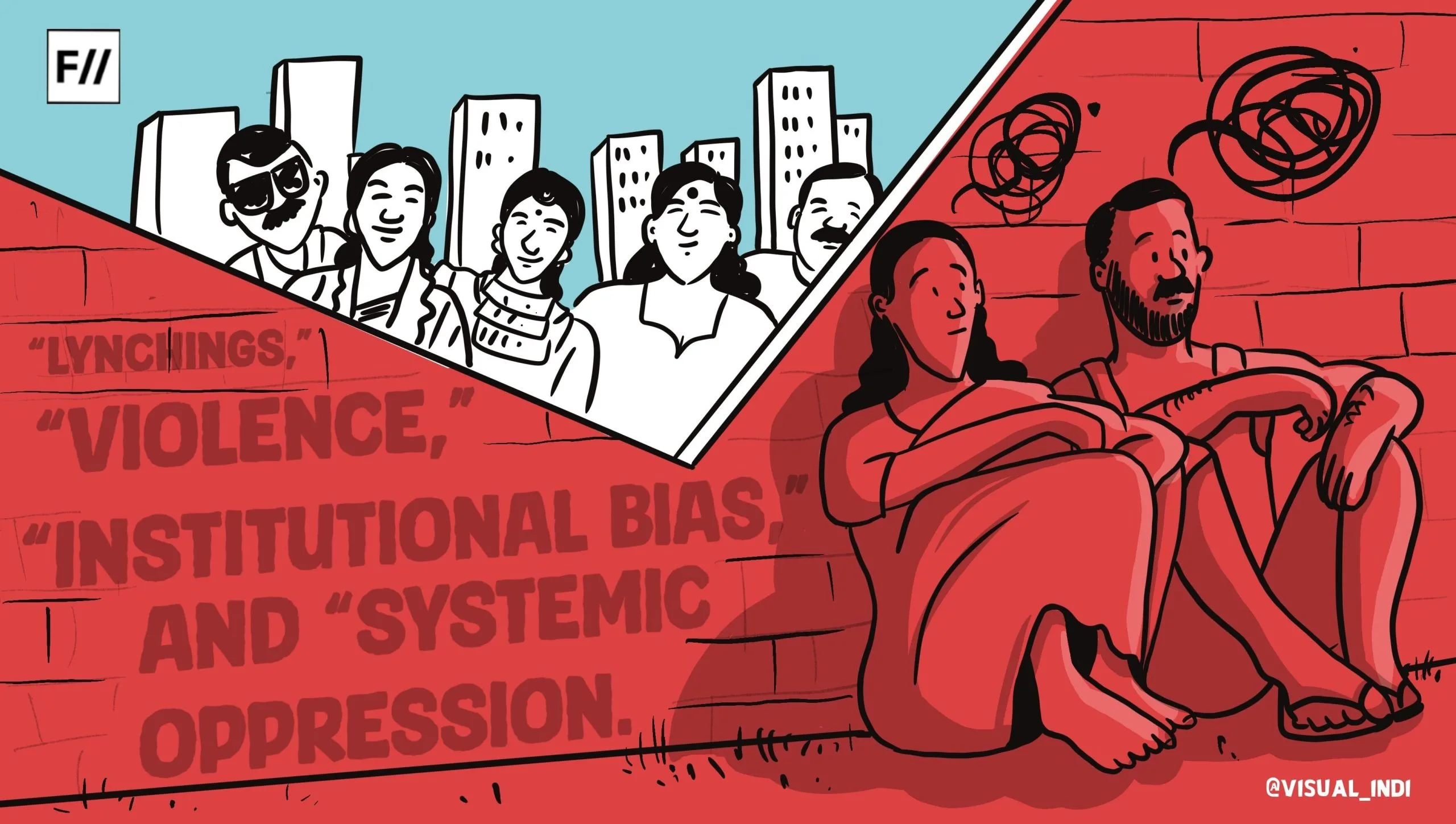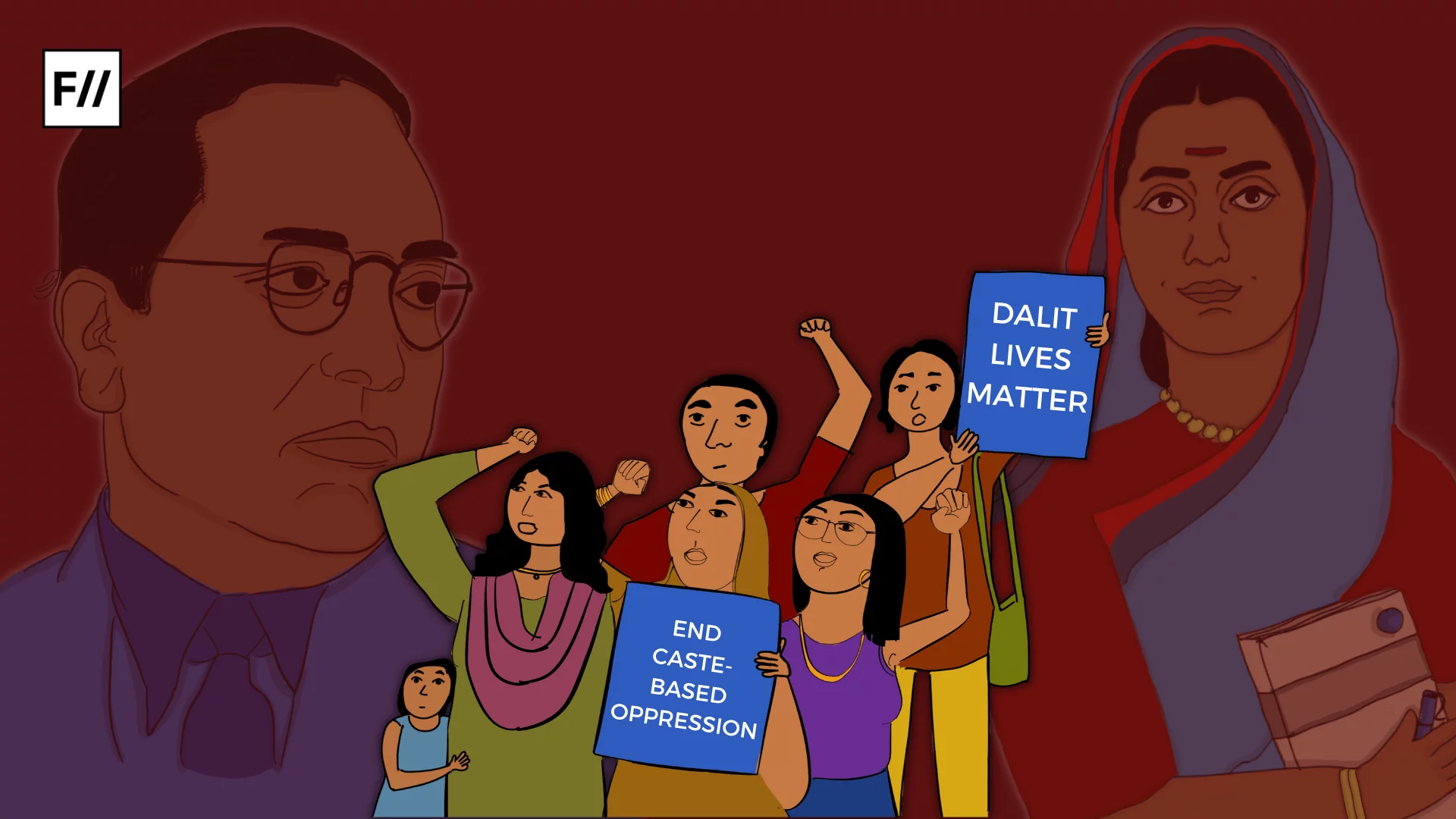India is a country with a lot of film industries. Bollywood and regional cinema are very popular, even outside the country. And in these films, the major theme almost always is romance. They portray romantic love that is transgressive, taboo, and breaking typical social norms. And they win. At the end of the movie, the couple is happily united. But what’s interesting is how far from reality this is. Despite the portrayal and championing of young love by the film industry, arranged marriages are still more common than love marriages in India.
Inter-caste marriages are even rarer. According to a 2011 survey, only 5.8% of marriages in India are inter-caste marriages. This shows how it is not a common practice for people to marry outside their community in our country, and there are a lot of factors affecting this. These are the same factors which define the sociocultural environment for such inter-caste relationships, affecting the dynamic as well the psychology of the partners involved.
The hidden cost of inter-caste marriages
Caste discrimination is most certainly not a thing of the past. Though still blatant, many of the times it is subtle and veiled in seemingly innocent turns of phrase. In such a society, the norm is still to marry “within the community”, be it religion or caste. Inter-caste marriages, then, are far from the norm. Therefore, there is also the higher possibility of ostracising, isolating, and even condemning those who dare to transgress caste lines. Moreover, marriages are seen not just as the union of two people but as an alliance between two families. This means that parents’ approval and family support becomes a key factor for marriage.
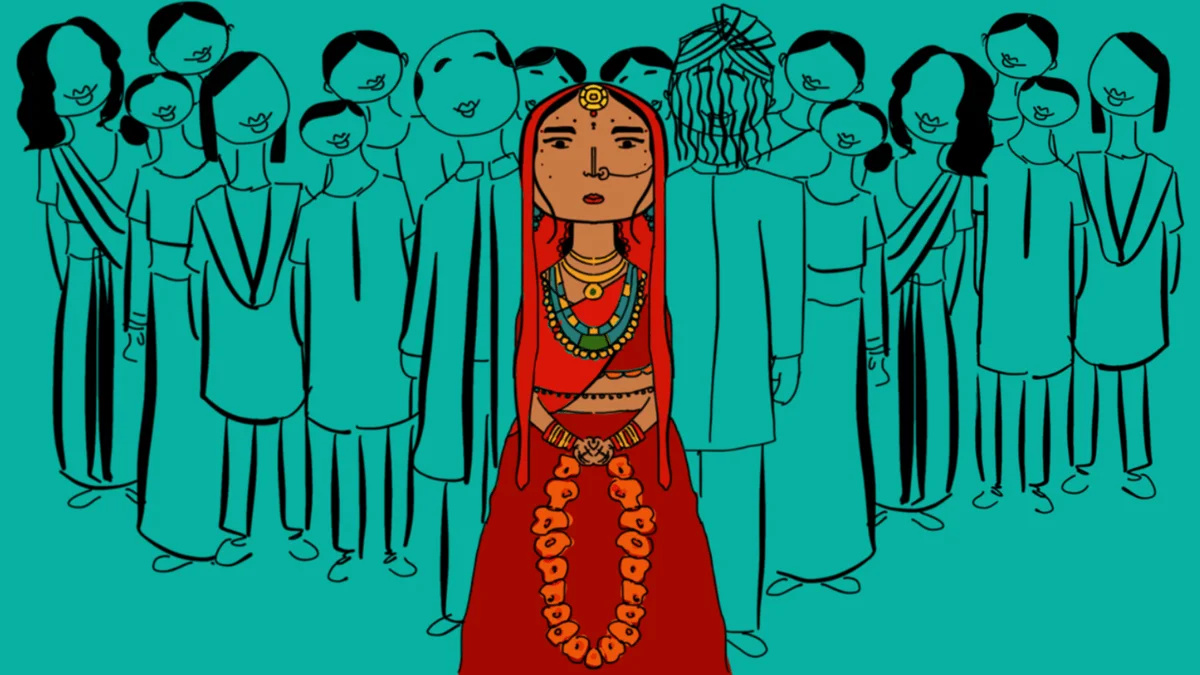
According to researchers, these factors tend to have an effect on the relationship. Firstly, they looked at the distribution of inter-caste marriages and found that they have more acceptance in urban areas as compared to rural areas. However, interestingly, Sanghera says that their frequency is higher in rural areas (5.2%) than in urban areas (4.9%). Chand et al. say that couples who engage in inter-caste marriages face severe consequences, including violence. Rajib Lochan Dhar divided the couples’ considerations into two broad categories: social context and personal context. Under the social context, they analysed data regarding reactions from relatives, reactions from the family, and the implications of the label. Under the personal context, they analysed psychological fear and the decision to go ahead. Guilt is also considered to play a significant role here.
Besides these socio-cultural factors, Selvaraj Nallathambi and Adithya Velayudhan discovered that acculturation stress is a huge factor in inter-caste marriages. This is the stress of adapting to a new culture, and can lead to various mental health concerns like anxiety and depression. It can also create feelings of hopelessness and loneliness.
Rajib Lochan Dhar divided the couples’ considerations into two broad categories: social context and personal context.
They concluded that ‘[a]round 16% of inter-caste married people reported high levels of acculturation stress, whilst 42% reported average levels of acculturation stress. As a result, inter-caste married people should receive an appropriate psychosocial intervention to help them cope with acculturation stress.’
Bridging the gap through social support
Based on these studies, it is important to understand the vital role of a support system for any married couple. Due to the lack of or minimal presence of such a support system for inter-caste couples, it impacts the relationship itself. Chand et al. argue that ‘[s]ocietal acceptance and stronger protective measures are necessary to reduce the risks faced by these couples‘. These researchers say that the partners also require support through NGOs as well as government initiatives, especially women and people from lower socio-economic backgrounds.
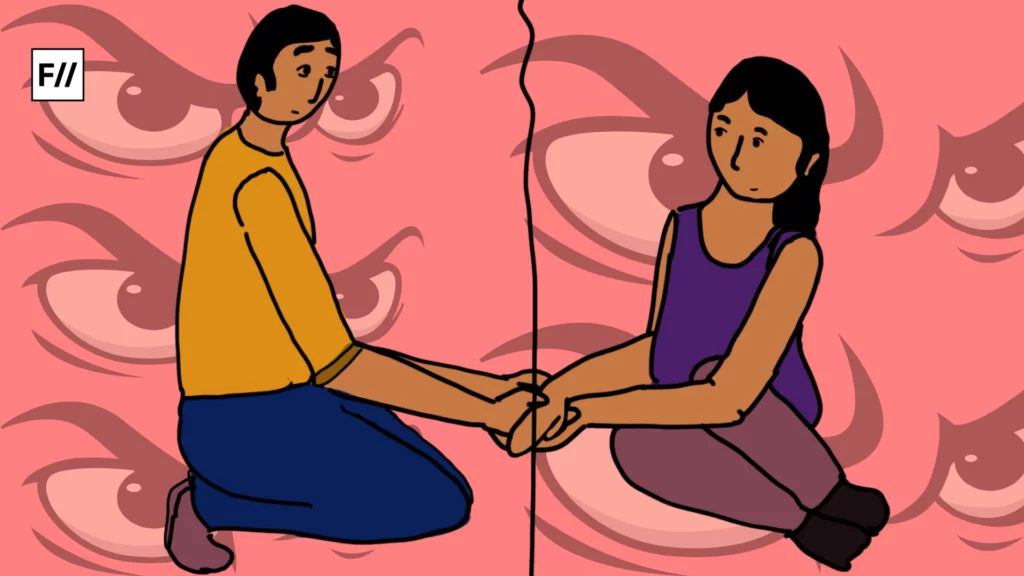
We’ve seen that inter-caste marriages are generally perceived to be crossing boundaries. This is especially noticed in cases where one partner is upper-caste and the other partner is Dalit. There are political aspects coming into play in that context, which influence and sometimes may dictate how the relationship is perceived by the general public. An upper-caste woman who falls in love with a Dalit or lower-caste man is seen as somehow who intends to “defile” their “pure” community. For Dalit and lower-caste men, loving an upper-caste woman is a dangerous act of assertion. And for Dalit or lower-caste women, the dynamic is often reversed: upper-caste male desire turns predatory, commodifying the subaltern woman’s body.
‘It is unclear whether the Dalit community itself encourages inter-caste marriages. Experiences around local patriarchies and power hierarchies, especially when Dalit women marry men from upper castes, are complex and hard to navigate,’ says Sreerekha Sathi, in her paper titled “Marriage Murders and Anti-Caste Feminist Politics in India.” She adds that it is important ‘to identify differences between the experiences of Dalit men marrying upper caste women and those of Dalit women marrying upper caste men and understand whether these experiences allow inter-caste marriage to weaken caste ideology and politics‘. She also adds that violence through practices she calls ‘marriage murders‘ is used as a means of retaliating to the act of transgression, in all cases.
For many Dalit men and women, to love is to endanger one’s life. Yet, and maybe because of this, the act of loving across caste lines is a way of rebellion. It is an act of defiance.
Considering all the things discussed, we can say that there may be an underlying sense of psychological fear and guilt in most of these relationships. This can be fear of loss, like the loss of parents and other family members, and the fear of violence. For many Dalit men and women, to love is to endanger one’s life. Yet, and maybe because of this, the act of loving across caste lines is a way of rebellion. It is an act of defiance.
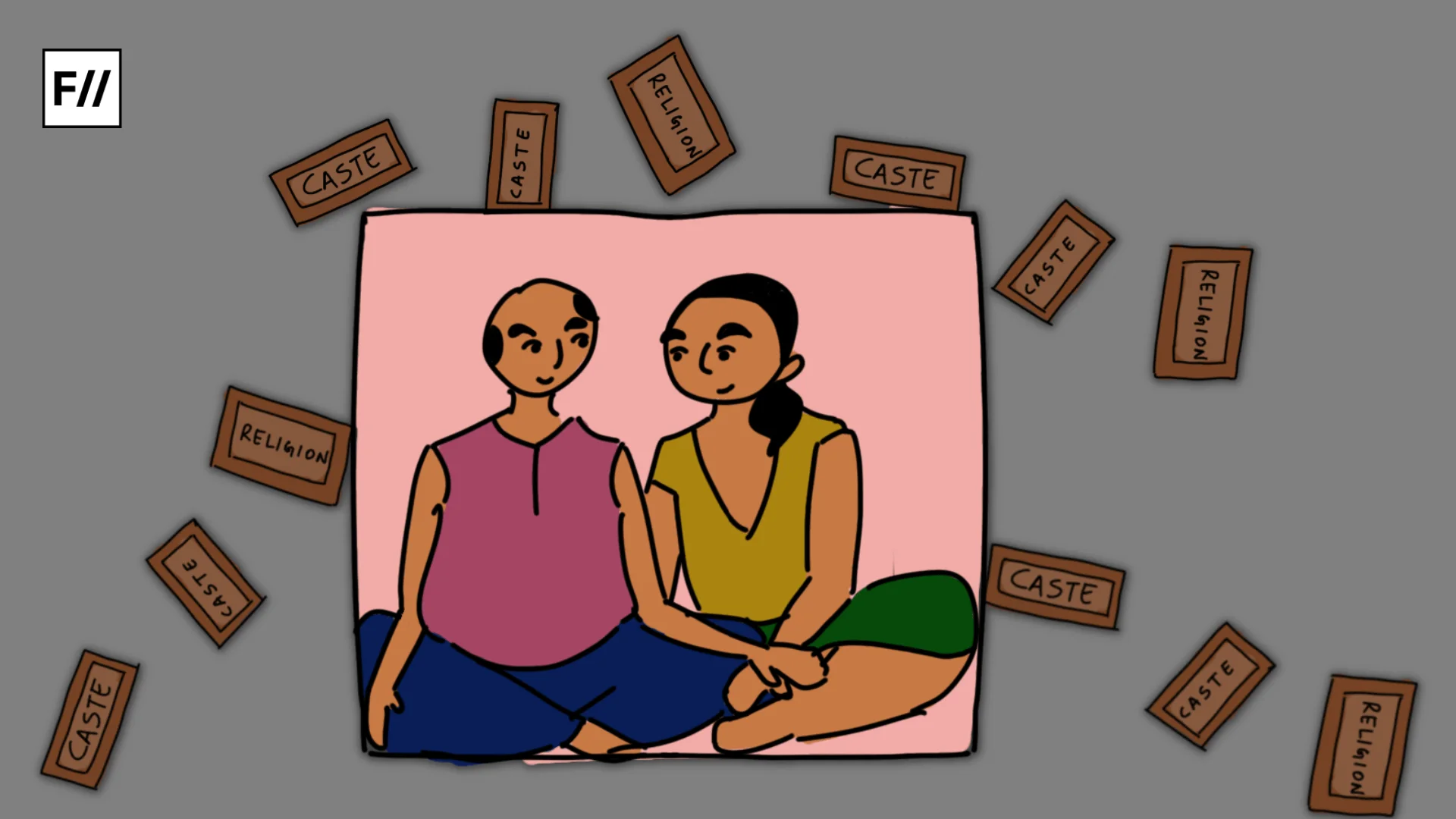
Anti-caste activists write about love as a form of resistance in their works. So to love across caste lines in India is to navigate an emotional terrain marred by the strain of secrecy, social hostility, and internalised shame. These may go unacknowledged by the mainstream mental health discourse, and this continues the cycle of silence. To talk about love and mental health meaningfully, we must stop dodging the question of caste.
References:
Chand, Gian, et al. “THE PSYCHO-SOCIAL DYNAMICS OF INTER-CASTE MARRIAGES IN CONTEMPORARY INDIA: CHALLENGES AND IMPLICATIONS.” ShodhKosh: Journal of Visual and Performing Arts, vol. 5, no. 5, May 2024. DOI.org (Crossref), https://doi.org/10.29121/shodhkosh.v5.i5.2024.4597.
Dcruz, Abigail Lean. “Love across Lines: Mental Health Challenges in India’s Inter-Caste Marriages.” Mind Body Bliss – the Place to Heal Your Mind and Body, 11 June 2024, mindbodybliss.in/relationships/love-across-lines-mental-health-challenges-in-ind-c34138b1/.
Dhar, Rajib Lochan. “Intercaste Marriage: A Study from the Indian Context.” Marriage & Family Review, vol. 49, no. 1, Jan. 2013, pp. 1–25. DOI.org (Crossref), https://doi.org/10.1080/01494929.2012.714720.
Nallathambi, Selvaraj, and Adithya Velayudhan. “Role of Demographics in Acculturation Stress Among Inter-Caste Married Individuals.” Contemporary Voice of Dalit, July 2023, p. 2455328X231158009. DOI.org (Crossref), https://doi.org/10.1177/2455328X231158009.
Sathi, Sreerekha. “Marriage Murders and Anti-Caste Feminist Politics in India.” Women’s Studies International Forum, vol. 100, Sept. 2023, p. 102816. DOI.org (Crossref), https://doi.org/10.1016/j.wsif.2023.102816.
About the author(s)
Samhita is a final year student of English Studies at IIT Madras. She enjoys reading, and especially loves engaging with women's fiction, as part of her academic research as well. She's a huge fan of sudokus, crosswords, and all sorts of puzzles.
